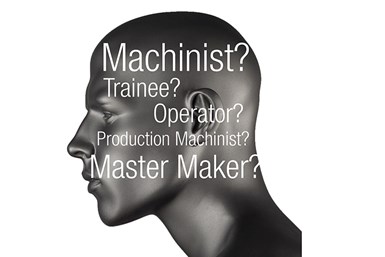What’s in a Name? Pride.
Titles matter to employees. Are your operators actually operators? Or do they read prints, check quality, change tooling and adjust oil lines like a machinist? Hmmm...

Companies could get creative with titles. Perhaps the setup employees are Rookies, Stars and Superstars instead of C, B and A. Image Credit: PMPA
What’s your title at work? Does it match what you do every day? Does it match your level of responsibility? Are you proud to tell people your title? Or do you tell them what you do because your title doesn’t tell the story? Titles matter as a form of communication and employee pride. What about your employees? What does their title say about them?
Titles in a Precision Machining Shop
I was at a PMPA Technical Programs Committee and I sat next to Pat Eliason, Shop Superintendent at Roberts Automatic Products in Chanhassen, Minnesota. We were talking about job functions and he mentioned that his pet peeve is when Machinists are called Operators. He continued saying that operators sound like they just push buttons. He currently uses the term Machinist Trainee because he expects them to become machinists. He is also thinking about using Production Machinist or Production Specialist. I started asking around and found that there are several shops who call some employees operators who do more than push buttons. But I could see the wheels spinning, wondering if they should still call them operators.
What are the titles at your company? Do they reflect the employee level of responsiblitity and what they do? I pulled the list of titles used on PMPA’s Wage Survey:
- Team/Group Leader
- Setup
- Combination, Setup & Operator
- Operator
- Trainee - entry level
These are generic titles so that all the participating shops have a place to list their wage. Those work for a survey. But do they work for the human beings who are the greatest asset in your shop? Your employee’s title is part of their identity in the workplace — it’s important to make sure it is the right title.
Creative Titles
There is a trend for executives to adopt creative titles: Chief Problem-Solver, Number Ninja, Boss of All Things, etc. The upside to creative titles is they can further your brand and show progressive thinking which may lure younger people to apply. The creative titles don’t have to be limited to the office folk — they can work for the shop floor, too.
You could get creative with titles. Perhaps the setup employees are Rookies, Stars and Superstars instead of C, B and A. Maybe your machinists are Machine Masters or Master Makers. You could get really creative with the titles, but keep in mind that they need to be consistent across the employees and reflect what the employee does and their responsibility level.
Recruiting & Retention
Giving your employees the proper title — whether it is traditional or creative — can boost morale. There is pride in being a machinist. There is pride in being a foreman, lead person, engineer or quality manager. There is pride in being in precision machining and the best form of workforce recruitment is recommendations from your employees. If your employee has a title they are proud to tell others, their pride will depict that the employee likes their job, likes where they work and likes what they do. What could that do for your business?
About the Author
Carli Kistler-Miller
Carli Kistler-Miller, MBA, has over 20 years of experience with communications, event/meeting planning, marketing, writing and operations. Email cmiller@pmpa.org at PMPA.
Related Content
Machining Unleaded Materials — Reliability is Possible
Leaded steel is no longer produced in the United States. How do shops approach unleaded brass and steel machining?
Read MoreCraftsman Cribsheet No. 119: Defeating the Hanging Cross-Hole Burr
Deburring is a tedious task that is better left to machines.
Read MoreCold-Drawn Steel Barstock: How It Is Manufactured, Benefits to Your Shop
Understanding the benefits provided by cold-drawn steel barstock can help you optimize the work you quote by maximizing benefits to your manufacturing process and customer.
Read MoreRoles of Women in Manufacturing: What I Learned
Over 20 women were featured in the Roles of Women in Manufacturing series, which started in January 2023.
Read MoreRead Next
5 Aspects of PMTS I Appreciate
The three-day edition of the 2025 Precision Machining Technology Show kicks off at the start of April. I’ll be there, and here are some reasons why.
Read MoreA Tooling Workshop Worth a Visit
Marubeni Citizen-Cincom’s tooling and accessory workshop offers a chance to learn more about ancillary devices that can boost machining efficiency and capability.
Read MoreDo You Have Single Points of Failure?
Plans need to be in place before a catastrophic event occurs.
Read More












.png;maxWidth=300;quality=90)









.png;maxWidth=970;quality=90)